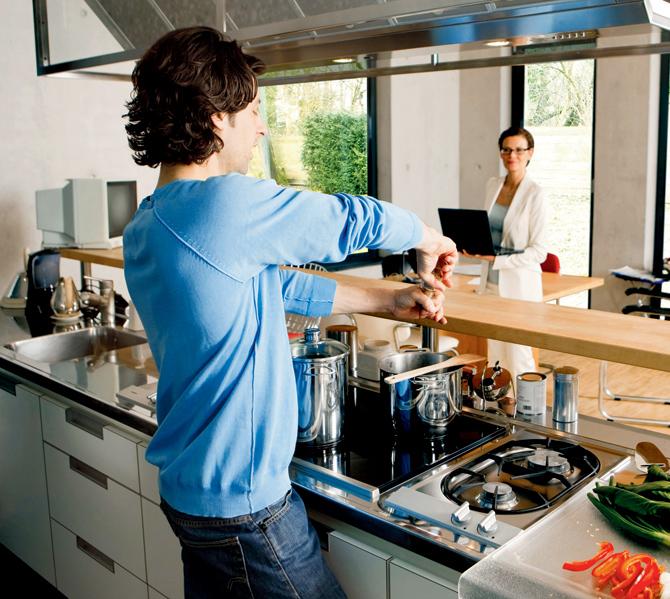While Arjun Kapoor-Kareena Kapoor starrer Ki & Ka puts the spotlight on men who choose to manage the house, are city couples ready for a role reversal? Not yet, say psychologists

![]() Mumbai-based Ravi and Pooja Sahni, (names changed) both in their early thirties, recently visited clinical psychologist Seema Hingorrany with complaints of fights, arguments and verbal abuses. During history intake, Hingorrany realised that Pooja was working in a multinational company while Ravi, had taken on writing projects from home.
Mumbai-based Ravi and Pooja Sahni, (names changed) both in their early thirties, recently visited clinical psychologist Seema Hingorrany with complaints of fights, arguments and verbal abuses. During history intake, Hingorrany realised that Pooja was working in a multinational company while Ravi, had taken on writing projects from home.
ADVERTISEMENT

Cracks appeared when Ravi began to think that Pooja had no time to reply to his texts or calls. Pooja felt her husband was getting clingy, demanding a lot of her time, and not appreciative of the hard work she was putting in. Both felt the other was taking them for granted. Thankfully, counselling helped them realise that role reversal was not easy to deal with in an Indian social setting.

Representation pic
Last week’s release, Ki &Ka, has a story line that challenges gender roles. Similarly, a television commercial for a washing powder shows the plight of a father who realises he has set a bad example when he sees his daughter cope with housework alone, bringing the focus back to the age old debate.
Factor it in
"Such cases are frequent. Initially, couples decide that the woman has better opportunities and hence, will step out and work and the man will be a househusband. Soon after, egos get in the way. Sadly, if the couple doesn’t seek psychological help, they drift apart. It also has a lot to do with the power struggle between couples," says Hingorrany. "Common insecurities manifest as arguments and fights. I see men feeling insecure. They fear their partner might lose interest in them and get attracted to other men at higher positions," she adds.
Often, family, society and peer pressure also play a part to play. Ananya and Gautam Rawal (names changed), were happily married until she saw a promotion in her well-paying job and had to spend longer hours in her office. Gautam gave up his career to baby-sit their one-year-old daughter.

Representational pic
His parents were not happy with the decision, but the couple felt it was the right thing to do. With the perception that he was a failure, Gautam became easily irritable. The couple continue to undergo therapy.

Ameeta Sanghavi Shah
With more urban women leaving home to take on professional roles, the debate has usually been focused on shared responsibility, where both partners contribute to housework.

Is a 100 per cent role reversal the next step? "Usually, such a situation originates in a dual career household. Here, partners take on both roles and adapt according to their ability to juggle time for childcare, breaking free of the traditional divide. Role reversal is more of a choice in a household with dependents, for instance children under-15 or senior citizens, who have to be taken care of. When dependents aren’t around, role reversal is not so stark. The househusband may also find time to take up a hobby, freelance or volunteer," believes life coach and psycho-physical therapist Ameeta Sanghavi Shah.
"The emergence of this idea is rarely planned from the start and may develop because it is the best option in a volatile economy where jobs are suddenly lost and the family adapts for the woman to earn while the man stays at home," she says.
The Indian urban couple
"Moreover in urban households. the man is likely to have help to do a lot of the jobs. Also, in a patriarchal set-up, a man will still be the owner of the property and so, is able to fulfill his role as provider," she points out, adding that most often, the situation is solved with the help of tiffin services or ready-to-eat foods, hiring a household help for cooking, cleaning and child-related work and grandparents pitching in, especially in joint families.
Shah has also interacted with couples who have succeeded in reversed roles. Here, the man finds a way to express himself besides being restricted to parenting and housework. "When Maria’s (name changed) business began to grow, her husband Sebastian (name changed), who held an interest in the arts, decided to be a stay-at-home parent to their daughters. He eventually has had reasonable success with it but nowhere close to her profitable business. However, they enjoy a very happy marriage," shares Shah.
Shah says, in India, role reversal is far from being a free-willed choice. She cites the example of a couple who approached her recently. When Shikha Nair (name changed) accused her husband Sumeet (name changed) of not helping with domestic chores, he offered to be a househusband and let her earn the cheque. Shikha was threatened by this proposition as she does not feel confident of her qualifications.
All about attention
A forced reversal can also be the result of addictions (alcohol or gaming etc), depression pr a job loss. Then, the woman may be working, parenting and caretaking all at once. Role reversal then can successful only if the man comes to terms with the situation and recovers emotionally.
"Respect, romance, attraction and love can be defined by roles and then, both, men and women may lose these for their partner if they stick to old paradigms. Women can miss out on the time at home with the children. They may also feel resentful when they can’t afford some thing going and may go back to the conventional role, blaming the man for not providing more instead of realising that since he is busy with household, he is not in a position to easily revive his career," says Shah.
"A husband can feel unfulfilled unless he is valued and finds something outside of home to express his talent. Social interaction matters. He may need to make time off to meet friends when his wife takes time off to baby sit," she adds.
"Frustration needs to be understood by both. Often, both partners feel stuck in having to balance domestic tasks and earn well. Couple communications coaching and counselling can help. As roles are blurring, conflict can escalate. Right communication will lend answers," Shah says.
 Subscribe today by clicking the link and stay updated with the latest news!" Click here!
Subscribe today by clicking the link and stay updated with the latest news!" Click here!






